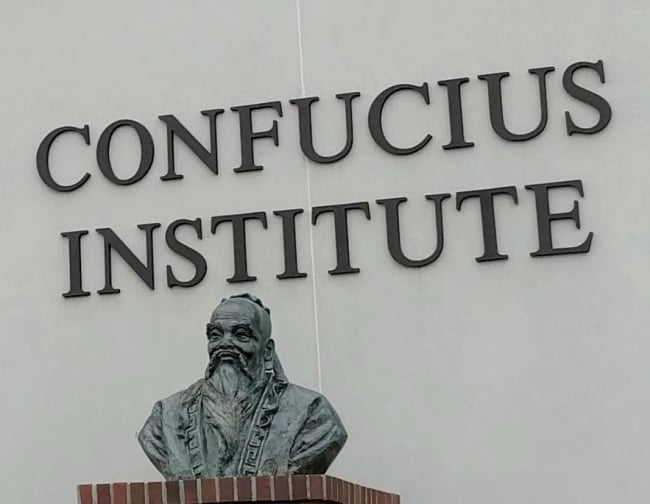You have /5 articles left.
Sign up for a free account or log in.

Wikimedia Commons/Kreeder13
The State Department announced Thursday that it was designating the Washington, D.C.-based Confucius Institute U.S. Center a "foreign mission" of the People's Republic of China.
The center coordinates language and cultural programs for the Confucius Institutes, Chinese government-funded centers for language education and cultural programming, at colleges across the United States. The institutes have run afoul of Congressional lawmakers who see them as vehicles for disseminating Chinese government propaganda in U.S. classrooms.
This latest move by the State Department reflects another way in which an increasingly adversarial and competitive relationship between the U.S. and China has affected academic exchange. The State Department says the designation recognizes the Confucius Institute U.S. Center "for what it is: an entity advancing Beijing's global propaganda and malign influence campaign on U.S. campuses and K-12 classrooms.
State Department officials said in a press briefing that the designation of the Confucius Institute U.S. Center does not directly affect campus-based Confucius Institutes, but does mean that the coordinating office in Washington will have to provide the State Department with regular reports about funding, personnel and operations of Confucius Institutes and Confucius classrooms across the U.S. and to provide information about curriculum and training material.
David R. Stillwell, Assistant Secretary of State for the Bureau of East Asian and Pacific Affairs, said the designation "is not going after Confucius centers per se, although we would ask that universities again take a hard look at what those institutes are doing on their campuses and then decide for themselves if this is something that supports and advances academic freedom and our democratic values, or not."
Gao Qing, the executive director of the Confucius Institute U.S. Center, said the center is "more than happy to work with the State Department and their request for more information" and that "much of the information requested is either already publicly available or has been offered to the State Department multiple times in the past in a good faith effort to be transparent."
"We have also made multiple attempts to open our organization to the press to show that we, as a predominantly American staff, are committed to transparency," Gao said. "Sadly we have been seldom taken up on our offers to not only show the work we're doing, but to allow our American students to speak to their educational experiences through not only our organization, but the independent, university-controlled Confucius Institute programs across the country.
"Apparently, we are living in a time where teaching a foreign language is now seen as a political act by some people," Gao said. "As ironic as it sounds, our small team of American staff is still being defined as a 'Foreign mission.' We are not a headquarters for American Confucius Institutes, but a small office in Washington, D.C., devoted to global education services and intercultural opportunities for American communities. Clearly caught up in international saber rattling, this naked political opportunism is in serious need of a fact check."
U.S. officials said there are currently 75 Confucius Institutes in the U.S., including 65 located on U.S. campuses.
An estimated 45 U.S. colleges have closed their Confucius Institutes over the past couple years as they have increasingly come under pressure from lawmakers. A number of colleges closed the institutes after the passage of a defense spending bill in 2018 that barred colleges hosting Confucius Institutes from receiving funding for Chinese language funding from the Pentagon, which operates the Flagship Language program.
Proponents of the Confucius Institutes welcome the funding they provide for Chinese language learning and cultural programming, and point out that the institutes are typically structured as partnerships between a Chinese university and an American host university.
But academic freedom watchdogs have long raised concerns about Confucius Institutes. The American Association of University Professors issued a statement in 2014 urging colleges to consider ending their involvement with the institutes, arguing that colleges "permit Confucius Institutes to advance a state agenda in the recruitment and control of academic staff, in the choice of curriculum, and in the restriction of debate."
The move against the Confucius Institutes comes against the backdrop of deteriorating academic relations between the U.S. and China. Christopher Wray, director of the Federal Bureau of Investigation, has warned of the threat of Chinese students and scientists stealing academic research, and a number of visiting Chinese scholars have been arrested for allegedly failing to disclose their affiliations with Chinese universities or government entities on federal applications or tax forms or, in several recent cases, for allegedly hiding their ties to the Chinese military.
President Trump also signed an executive order last month directing administration officials to end the Fulbright program in China and Hong Kong in retaliation for Beijing's encroachments on the relative autonomy of Hong Kong.
Although Republicans have led the charge in calling for the closure of Confucius Institutes, Democrats have had concerns as well. In February 2019, the U.S. Senate's Permanent Subcommittee on Investigations issued a bipartisan report that found a lack of transparency in the operations of the institutes and alleged that the "Chinese government controls nearly every aspect of Confucius Institutes at U.S. schools, including its funding, staff, and all programming."






